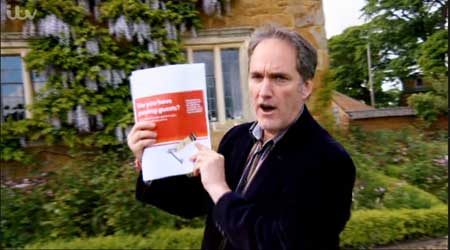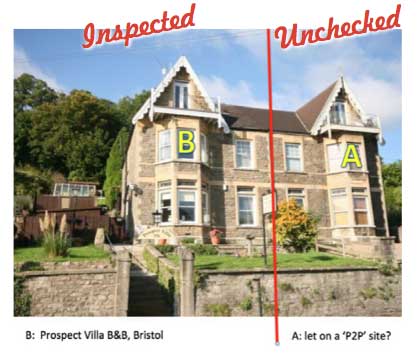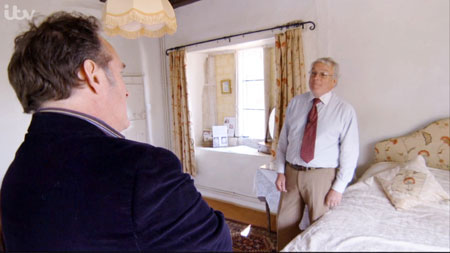
|
|

|
ITV investigation reveals fire safety risks
at Airbnb properties - Fire Authorities
failing to ensure public safety

Above: ITV reporter Jonathan Maitland with the official fire safety guidance for small premises
('Do You Have Paying Guests?'), outside a two-bedroom B&B closed by a Fire Officer
An ITV investigative programme last Summer has found that, over three years after the Bed & Breakfast Association first warned regulators, fire safety dangers are being left unchecked in the fastest-growing sector of tourist accommodation: premises let on 'peer-to-peer' (P2P) web platforms such as Airbnb, Wimdu and others.
The ITV "Tonight" programme broadcast on 16 July 2015 found that:
All 14 Fire Authorities quizzed admitted to making NO inspections of P2P premises last year, whilst inspecting 507 B&Bs;
A fire service veteran and fire safety expert told ITV that the risks posed by P2P premises were still "not on the radar" of Fire & Rescue Authorities;
None of the 10 Airbnb host premises visited by ITV appeared to be fully compliant with Government fire safety guidance for the smallest premises taking paying guests;
Closures are still taking place of small B&Bs found not to be compliant with regulations, whilst thousands of similar P2P premises are left unchecked;
P2P websites are not effectively informing 'hosts' of their legal responsibilities as premises owners; and
Both P2P 'hosts' and guests are at financial risk, because their insurance cover does not extend to paying guests.

Above: B&Bs are inspected for safety; P2P premises are not
The Bed & Breakfast Association first raised this issue with the Chief Fire Officers' Association (CFOA) on 22 March 2012, and over the years since then it and other industry bodies have been urging DCLG (the Government department responsible for Fire Safety), the CFOA and the Government's Chief Fire & Rescue Adviser to take action to close the enforcement "gap" and level the regulatory playing-field with similar-sized established, compliant hospitality businesses.
The CEO of the B&B Association and the deputy CEO of the British Hospitality Association met the then Fire Safety Minister (Brandon Lewis) on 28th April 2014 specifically on the issue of the failure of regulators to protect the public by including P2P premises in their inspection regimes. They called on him to act to ensure the fire safety of the fastest-growing part of the tourism accommodation market, both to protect consumers and to preserve the reputation of UK tourist accommodation.
Already there are over 65,000 UK premises listed on just one P2P website, Airbnb - which grew 73% in the UK last year. As a comparison, there are only around 25,000 B&Bs in the UK.
Yet ITV's exposť showed that over three years on from the regulators being warned, no action has been taken and fire regulators are still not protecting users of the rapidly-growing so-called "sharing economy'. ITV asked 14 Fire Authorities how many B&Bs they inspected last year: the number was 507. When asked about P2P premises (where fire regulations also apply), the number was zero.
When ITV asked why fire services hadn't visited any Airbnb premises, the Local Government Association (LGA) told them: "The number of fires in domestic properties has halved over the last decade. As these types of rentals grow more attractive, fire services are keen to work with homeowners and renters to ensure that these risks remain at an all time low."
A B&B Association spokesman called this response "a complacent and meaningless platitude that does nothing to reassure the over two million people a year who are sleeping overnight in premises that they trust are regulated for safety by the Fire Authorities - but which are being left unchecked".
The LGA response also ignores the law, which states that any premises taking paying guests must comply with the Fire Safety Order 2006. Fire Authorities are responsible for enforcing compliance by all premises in their area, based on actual risk.
Despite the "complacency" of regulators, ITV's latest investigation revealed that there are genuine grounds for concern for public safety: ITV visited 10 Airbnb properties across the country. Basic fire safety requires that there should be - at the very minimum - working smoking alarms on the landings. In two premises ITV visited, even that didn't appear to be the case. The regulations also say that guests must know how to exit the premises in the event of a fire. Not one of the Airbnb rooms appeared to have that information.
The official Government guidance for fire safety in the smallest premises let to paying guests ('Do You Have Paying Guests?') states that normally the minimum requirement is for at least a domestic-grade fire alarm system with detectors in every bedroom, wired to a central panel. In the B&B Association's experience, no fire officer visiting a B&B has ever accepted battery smoke detectors as sufficient to ensure paying guests' safety (contrary to what Airbnb advise their hosts).
If the Airbnb host premises visited by ITV were a representative sample, that would indicate that some 13,000 Airbnb premises across the UK may not even have working smoke alarms on each floor.

Fire Safety Consultant Bob Docherty (above), who has 33 years' experience in the UK Fire Service, told ITV Tonight that Fire & Rescue Authorities are still not even thinking about P2P premises:
"I think it's a new phenomenon and I don't think it's on their radar at all. Unless they are told about them then they do go under the radar and Fire and Rescue Services won't know about them until something happens - they get a complaint or there is a fire."
That echoes the response the B&B Association got from a Freedom of Information request to the London Fire Brigade (LFB) about the inspection of P2P premises in August 2014, when the LFB admitted that they "only come across them by complaint".
According to The Times (15 August 2015), of the 65,000 UK listings on Airbnb, 32,000 (49%) are in London. TripAdvisor (29 Aug 15) lists just 1,230 "B&Bs" in Greater London. Yet the London Fire Brigade only carries out ALL its inspections within the latter 3.7% of the combined total of small premises let to paying guests in the capital - leaving 96.3% of the accommodation used by tourists unchecked and un-inspected.
Julian Hilditch, National Resilience Adviser at the DCLG Fire Resilience and Emergencies Directorate then confirmed to the Association that Fire Authorities "visit these premises for the purpose of audit and enforcement in the event of either a fire safety concern being raised with them by a member of the public, or indeed in the event of a fire".
ITV's investigation fuelled worries that 'peer-to-peer platforms' such as Airbnb rely on the fact that the premises owner or 'host' is responsible for compliance, whilst the website owner is not - and that it is in the websites' commercial interests to play down regulatory requirements, so as to encourage hosts to list their premises. The ITV Tonight programme asked: are Airbnb hosts even aware that their rented rooms fall within the fire regulations?
Airbnb host Claire Bentley-Smith told the programme:
"I have never read what to do if there was a bad situation here. I thought they just came as a guest in your home in the same way a friend or family person would."
Airbnb said in a statement to ITV: "We require hosts to follow their local laws and we encourage all hosts to take some basic steps to keep their homes safe - and if guests alert us to a hazard or safety issue at a listing, we immediately suspend the listing and investigate."
The ITV programme also highlighted the danger for both 'hosts' and guests due to the lack of insurance cover for paying guests in premises insured by standard home insurance. Graeme Trudgill of the British Insurance Brokers' Association warned:
"If you rent out items on the internet for payment, you need to make sure you're properly insured in case something goes wrong. If you are lending a tool to a neighbour that is absolutely fine; providing no money changes hands your contents insurance, your occupier's liability will cover that risk. However the game changer is where there is money changing hands or if you advertise it on a sharing economy website. If you are doing that, then you need to refer it to your insurance company because it massively changes the risk for them."

To point up that stark contrast between the lack of inspection of Airbnb-type host premises and the regulation of bona fide B&Bs, ITV spoke to Simon Shouler (above), who used to run a two-bedroom B&B in his 16th century home, until one day the fire service came to inspect his property and closed it down on the spot because it didn't comply with fire regulations. He was told the property needed fire doors and an interconnecting smoke alarm system.
Every day local fire authorities make similar inspections of B&Bs and guest houses - but as the programme's investigations proved, no such inspections are made of the much larger (and fast growing) number of similar premises listed on websites like Airbnb, Wimdu, OneFineStay and others.
Viewers were left to wonder how many of those 70,000+ premises would - like the Shouler's two-bed B&B - be closed down for being unsafe, if a fire officer was ever to visit them?
The top fire regulator's assurance that an "audit" visit would take place after a fire has happened might be seen by consumers of "sharing economy" accommodation services as less than reassuring.
The Bed & Breakfast Association and other industry bodies will be using ITV's findings and other recent evidence to press Ministers and fire regulators to take action to close the enforcement "gap" before there is an avoidable tragedy.


The Bed and Breakfast Association was formed to inform members of matters affecting their businesses, including imminent legislative changes, to represent members' interests in consultations with Government and others, and to provide information and support services to members. There are many reasons to join us.
|










|

|